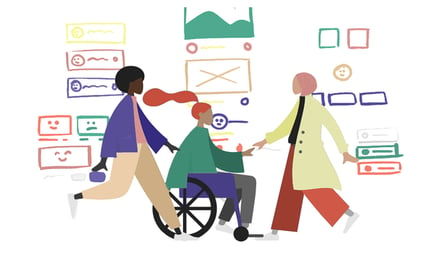
A 2-part series focusing on adopting an inclusive mindset in the workplace.
Equity Through Empathy represents more than a design philosophy; it signifies a commitment to comprehending and appreciating the diverse array of human experiences. As manufacturers, you hold the ability to profoundly influence people's lives through their products. By integrating empathy and inclusivity throughout their design process, you can develop spaces and services that genuinely accommodate everyone, thereby contributing to the creation of a more equitable world.
The Benefits of Equity Through Empathy and Inclusive Design
Equity through Empathy and inclusive design in manufacturing can bring significant benefits across various aspects of the industry, from boosting sales to enhancing productivity, attracting investments, and creating and/or maintaining job opportunities.
Sales:
Incorporating equity through empathy and inclusive design into manufacturing leads to products that resonate with a broader audience. By understanding and addressing the needs of diverse groups, including those with disabilities or from different cultural backgrounds, manufacturers can tap into new markets and demographics. This wider appeal often results in increased sales, as products are designed to be accessible and relevant to a larger portion of the population.
Productivity:
Fostering an environment of empathy and inclusivity not only enhances collaboration but also paves the way for innovative solutions. The convergence of diverse perspectives, originating from varied backgrounds and thought processes, facilitates inventive problem-solving. This diversity in thought can streamline processes, minimize the need for revisions, and accelerate productivity, thereby boosting overall output. Moreover, a workplace where individuals feel valued and included typically sees an uptick in performance quality.
Jobs:
Implementing empathy and inclusive design principles in workplaces not only enhances inclusivity but also broadens job opportunities for diverse candidates, including those with disabilities, enriching both workforce diversity and societal inclusivity. Moreover, the rising demand for professionals skilled in inclusive design can generate new job roles, expanding employment possibilities. In addition, companies prioritizing inclusion are more likely to retain employees, reducing turnover rates and fostering a motivated workforce through measures like flexible work policies, improved workspace accessibility, and nurturing inclusivity, ultimately enhancing employee satisfaction, well-being, and loyalty.
Strategies For Empathy and Inclusive Design in Manufacturing
- Listening to Everyone: Make sure to listen to a wide variety of people, especially those who often get overlooked, to really understand what they need and want.
- Working Together: Involve individuals from diverse backgrounds in both internal and external processes to ensure their perspectives and ideas contribute to shaping the products you develop and the work environment you cultivate.
- Inclusive Creation (Universal Design): Prioritize designing processes and spaces that are accessible and accommodating to everyone, regardless of personal background or potential challenges faced.
- Continuous Engagement and Feedback: Actively seek feedback from a diverse audience and remain open to adapting your creations based on their input, ensuring continuous improvement and universal appeal.
Those embarking on this transformative journey are encouraged to let empathy lead their way in crafting products that not only serve but also celebrate the richness of the human spirit.
Schedule a 15 minute DEI call with Paola Velasquez, Director of DEI in Manufacturing at IMEC.




